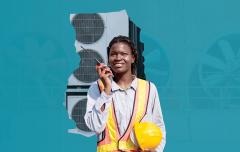Cooling and energy efficiency at the SEforALL Global Forum in Barbados
The need for accelerated action on sustainable cooling and energy efficiency was on display at the SEforALL Global Forum on 12–13 March 2025 in Bridgetown, Barbados.
Champions and experts from Mission Efficiency, the Cool Coalition, Sustainable Energy for All, and implementing partners such as RMI highlighted scalable solutions to accelerate energy efficiency, expand access to sustainable cooling, and support the just energy transition in climate-vulnerable countries at the Barbados event.
Small islands, big solutions
Small Island Developing States (SIDS) face acute challenges from limited access to cooling, impacting livelihoods and resilience. Rising temperatures, coupled with a lack of reliable and affordable cooling solutions, exacerbate food spoilage, disrupt critical cold chains for fisheries and agriculture, and increase health risks from heat stress. This lack of access disproportionately affects vulnerable populations, especially those in SIDS, and hinders economic development.
In Bridgetown, a SIDS Ministerial on climate finance, energy transitions, and resilience highlighted the urgent need for sustainable cooling solutions to build climate-resilient economies. The 'Call to Action' issued by the Ministers and high-level representatives signalled their collective ambition to scale up access to sustainable cooling technologies, aligning with commitments made in the Global Cooling Pledge.
SIDS delegates also asked development partners to improve access to concessional financing and support strengthened regional cooperation to address climate vulnerabilities. In this context, mitigating the impacts of extreme heat in SIDS will be a key enabler of just and inclusive energy transitions.
Innovation for impact
At the Forum, RMI CEO Jon Creyts delivered a presentation on “Efficiency first: cooling without compromise,” where he elaborated on how doubling the pace of efficiency gains and tripling renewables capacity through 2030 can dramatically reduce emissions, ease pressure on power systems, and expand access to affordable, sustainable cooling for vulnerable populations.
In addition, he noted to the audience that rethinking cooling technologies is only the beginning while drumming up support for a systems-based approach to energy efficiency, including built environment, transportation, and heavy industries.
He highlighted several flagship initiatives that RMI is championing across the cooling sector, including the Global Cooling Prize—a global competition to reimagine residential air conditioning; Palava City, a living laboratory for cutting-edge energy efficiency solutions; and the Global Cooling Efficiency Accelerator, a coalition laying the foundation for next-generation, scalable cooling technologies.
Durodoluwa Femi-Ajala Co-founder of Youth Sustainable Development Network (YSDN), provided an overview of the CoolCycle project, which aims to create sustainable agro cold chains across Nigeria through solar-powered cold storage systems utilizing a 12-ton cold room powered by 15 kWp solar energy.
Global ambition
Brian Dean, Director of Energy Transition at SEforALL, spoke during the session on “Driving Ambition on Commitments To Just And Inclusive Energy Transitions.”
This session spotlighted key commitments on efficiency, the integration of renewable energy and battery storage into energy grids and sustainable cooling. It also drew on lessons from Brazil’s G20 Presidency and explored avenues to catalyze South Africa’s G20 leadership in advancing a people-centered energy transitions.
Outcomes included identifying opportunities to address critical barriers to implementing commitment frameworks in developing countries, including the Global Cooling Pledge, and spotlighting key efforts such as the SEforALL Grid Health Assessment for African countries. Notably, discussions revealed a significant financing gap hindering progress on energy efficiency commitments. Data indicates we are substantially behind projected investment levels needed to meet global efficiency goals.
To bridge this gap, discussions focused on strengthening multi-stakeholder collaboration and leveraging frameworks like NDCs and UN-Energy Compacts to drive implementation. Prioritizing energy efficiency and cooling solutions within NDCs and ensuring they can help attract adequate financing with concrete action plans was identified as a key next step ahead of COP30.
In conclusion, the SEforALL Global Forum in Barbados identified the need for faster and more effective financing to meet our commitments under the Global Cooling Pledge, the COP 28 Renewables and Energy Efficiency Pledge, and the Global Energy Storage and Grids Pledge.



